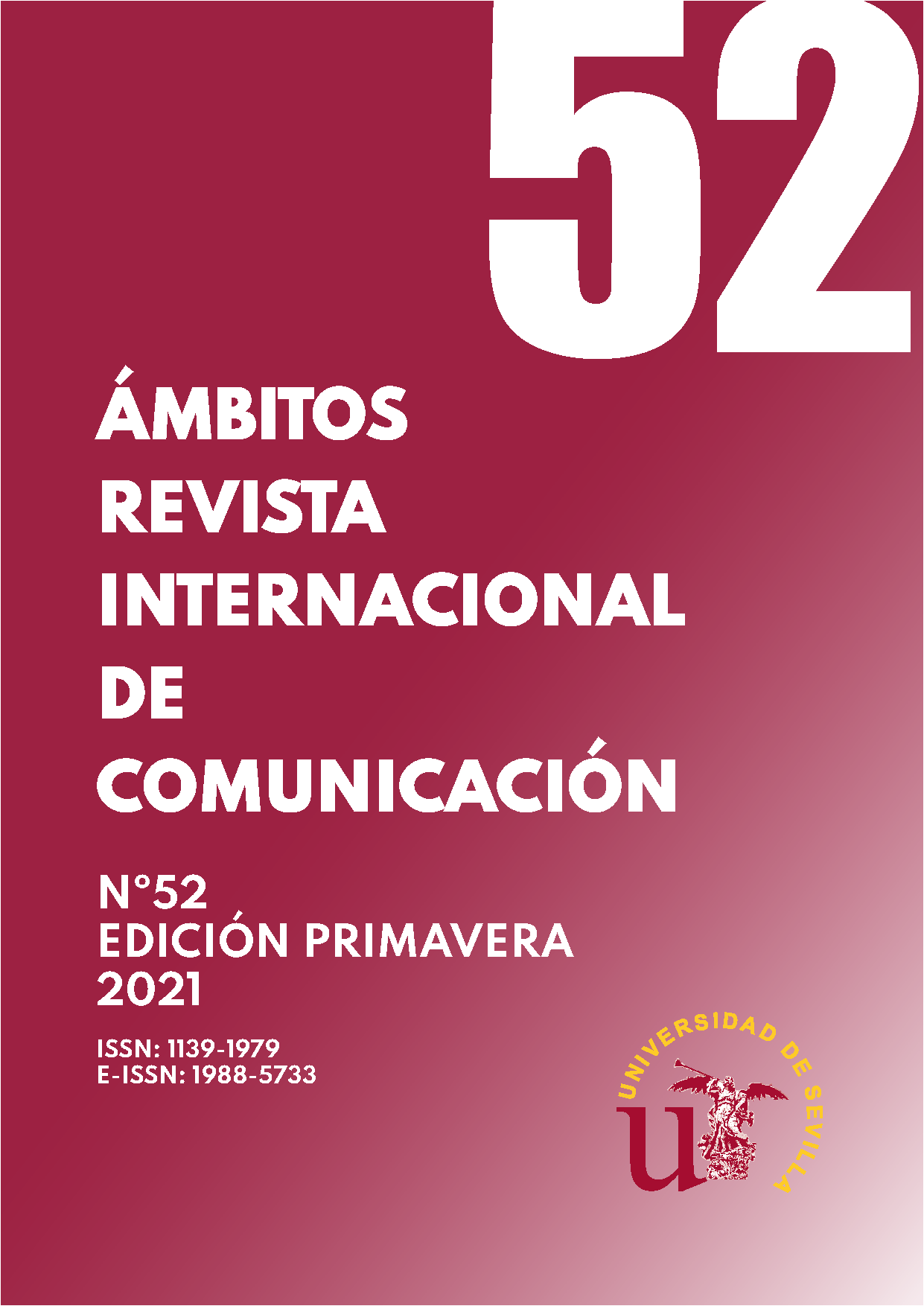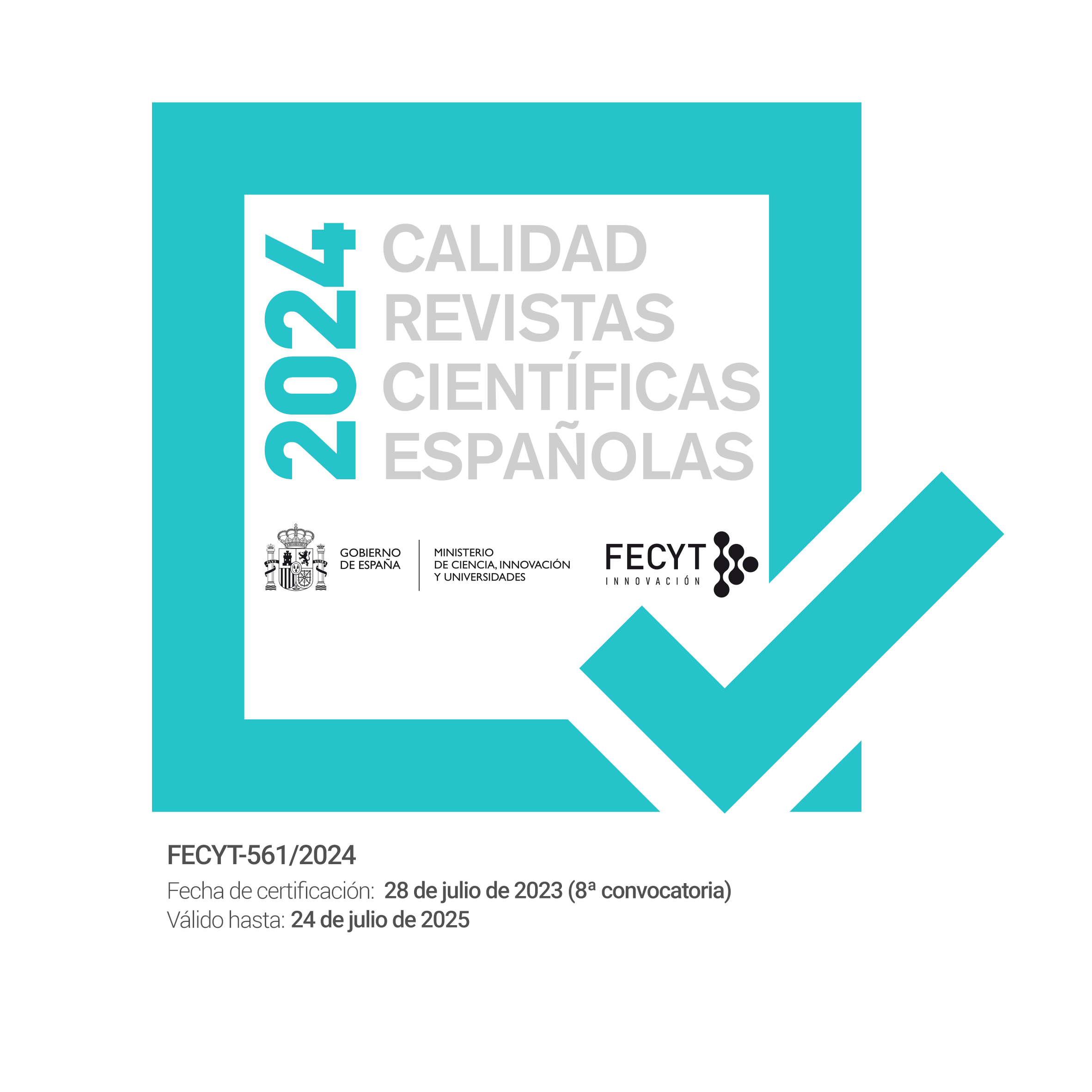“Toda a fonte do mal é a Folha de São Paulo”: a relação entre Bolsonaro e Folha pelas ombudsman
DOI:
https://doi.org/10.12795/Ambitos.2021.i52.06Palabras clave:
Jair Bolsonaro, Folha de São Paulo, ética jornalística, ombudsman, crítica ao jornalismoResumen
O relacionamento do presidente do Brasil Jair Bolsonaro com a imprensa, durante a eleição e o primeiro ano de governo, foi marcado por conflitos e declarações polêmicas. Uma dessas declarações teve como alvo um dos maiores jornais de circulação no país, a Folha de São Paulo, na qual Bolsonaro chegou a dizer que “toda a fonte do mal é a Folha de São Paulo”. A fim de entender a relação entre esses atores de importância social e propor a reflexão sobre a ética jornalística, o trabalho analisa como as ombudsmans do jornal Folha de São Paulo interpretaram a cobertura jornalística sobre Jair Bolsonaro realizada pelo veículo nos anos de 2018 e 2019. O método de análise de dados utilizado foi a análise de conteúdo. O recorte estudado compreende os anos de 2018 e 2019, período de eleição e primeiro ano de governo de Jair Bolsonaro, e dois mandatos de ombudsmans da Folha. Nesse período, foram selecionados 45 textos que mencionam Bolsonaro ou seu governo, os quais foram analisados a partir das categorias de análise: mediação das ombudsmans; ideias em conflito; e necessidade da crítica. Assim, foi possível identificar que os conflitos entre Bolsonaro e Folha se intensificaram com o aumento na aparição do político em reportagens investigativas e furos jornalísticos do veículo, e que as ombudsmans apontam saturação de declarações polêmicas do presidente no noticiário da Folha de São Paulo.
Descargas
Citas
Bardin, L. (2011). Análise de conteúdo. Edições 70.
Bittencourt, M. C. A. (2020). A construção da figura política de Bolsonaro no El País: um exercício metodológico para análise sobre produção de sentido no jornalismo. Galáxia, 43, 168-187. https://www.scielo.br/pdf/gal/n43/1982-2553-gal-43-0168.pdf.
Braga, J. L. (2017). Crítica na Sociedade em Midiatização. En C. C. Rizzoto (org.). A gente vê por aqui: práticas e reflexões sobre crítica de mídia.
Bucci, E. (2000). Sobre ética e imprensa. Companhia das Letras.
Christofoletti, R. (2008). Ética no jornalismo. Contexto.
Costa, G.; Rodrigues, C. & Mitozo I. (2019). Twitter como rede de comunicação governamental? Uma análise do agendamento do jornalismo impresso brasileiro pelos tweets de Jair Bolsonaro. Associação Brasileira de Pesquisadores em Jornalismo, 17. http://sbpjor.org.br/congresso/index.php/sbpjor/sbpjor2019/paper/viewFile/2187/1058.
Ferrucci, P. (2018). The End of Ombudsmen? 21st-Century Journalism and Reader Representatives. Journalism & Mass Communication Quarterly, 96(1), 288-307. https://doi.org/10.1177/1077699018805986.
Franzoni, S. (novembre de 2012). Um lugar ambivalente: a função do ombudsman da Folha de S. Paulo. [ponencia]. 10º Encontro Nacional de Pesquisadores em Jornalismo. Pontifícia Universidade Católica do Paraná. Curitiba, Brasil. https://conferencias.unb.br/index.php/ENPJor/XENPJOR/paper/view/1890/148.
Genro Filho, A. (1987). O segredo da pirâmide: para uma teoria marxista do jornalismo. Tchê!
Gomes, W. (2009). Jornalismo, fatos e interesses: ensaios de teoria do jornalismo. Série Jornalismo a Rigor, 1. Insular. Capítulo 2: Verdade e perspectiva: a questão da verdade e o fato jornalístico.
Gomes, M. R. (2004). Ética e Jornalismo. Coleção Ensaios Transversais.
Karam, F. J. C. (2004). Ética Jornalística e o Interesse Público. Summus Editorial.
Karam, F. J. C. (2009). Jornalismo e ética no século XXI. Anuário Unesco/Metodista de Comunicação Regional, 13(13), 15-27. https://www.metodista.br/revistas/revistas-ims/index.php/AUM/article/viewFile/2185/2111.
Maia, K. B. F. (2006). O ombudsman na Folha de S. Paulo: entre a crítica da mídia e as reclamações dos leitores. Encontro Nacional de Pesquisadores em Jornalismo, 4. https://www.academia.edu/1363379/O_ombudsman_na_Folha_de_S_Paulo_entre_a_cr%C3%ADtica_da_m%C3%ADdia_e_as_reclama%C3%A7%C3%B5es_dos_leitores.
Meditsch, E. (1998). Jornalismo como Forma de Conhecimento. Rev. Bras. De Ciên. da Com., S. Paulo, 21 (1), 25-38. http://www.bocc.ubi.pt/pag/meditsch-eduardo-jornalismo-conhecimento.pdf.
Nascimento, L. et al. (2018). “Não falo o que o povo quer, sou o que o povo quer”. Plural, 25, 135-171. https://www.revistas.usp.br/plural/article/view/149019.
Neto, A. F. (2008). OMBUDSMAN: a interrupção de uma fala transversal. Intexto, 2(19), 1-15. https://seer.ufrgs.br/intexto/article/view/8009
Paulino, F et al. (2017). Ombudsmen e observatórios de média: proximidades e diversidades. Revista Internacional de Comunicación y Desarrollo, Artículos de Investigación, 2(6), 69-81. https://doi.org/10.15304/ricd.2.6.3944.
Rebouças, H. (2019). Quando o Twitter pauta o jornal: análise da cobertura da Folha de S. Paulo sobre o perfil de Jair Bolsonaro. Associação Brasileira de Pesquisadores em Jornalismo, 17. http://sbpjor.org.br/congresso/index.php/sbpjor/sbpjor2019/paper/viewFile/1979/1060.
Recuero, R. (2019). Disputas discursivas, legitimação e desinformação: o caso Veja x Bolsonaro nas eleições brasileiras de 2018. Comunicação Mídia e Consumo, 16 (47). http://revistacmc.espm.br/index.php/revistacmc/article/view/2013.
Rizzoto, C. C. (2017). A gente vê por aqui?: práticas e reflexões sobre crítica de mídia/organizada. Syntagma Editores.
Sponholz, L. (2004). O que o jornalismo pode aprender com a ciência: Objetividade na perspectiva do racionalismo crítico de Karl Popper. Actas do III SOPCOM, VI LUSOCOM e II Ibérico, 4, 97-104. https://www.researchgate.net/publication/274370950_O_que_o_jornalismo_pode_aprender_com_a_ciencia_Objetividade_na_perspectiva_do_racionalismo_critico_de_Karl_Popper.
Sponholz, L. (2007). Entre senso comum e ciência: o conhecimento híbrido do jornalismo. Ciências & Cognição, 10, 02-14. http://www.cienciasecognicao.org/revista/index.php/cec/article/view/617.
Sponholz, L. (2009). O que é mesmo um fato? Conceitos e suas consequências para o jornalismo. Revista Galáxia, 18, 56-69. https://revistas.pucsp.br/index.php/galaxia/article/view/2642.
Descargas
Publicado
Cómo citar
Número
Sección
Licencia
Ámbitos. Revista Internacional de Comunicación es una revista de acceso abierto, lo que significa que todo su contenido está disponible gratuitamente para el usuario o su institución. Los usuarios pueden leer, descargar, copiar, distribuir, imprimir, buscar o enlazar con el texto completo de los artículos, o utilizarlos para cualquier otro fin lícito, sin solicitar permiso previo al editor o al autor. Esta definición de acceso abierto se ajusta a la Iniciativa de Acceso Abierto de Budapest (BOAI).

A menos que se indique lo contrario, todo el contenido de la edición electrónica se distribuye bajo una " licencia internacional Creative Commons Attribution-NonCommercial-ShareAlike 4.0 ". Puede consultar la versión informativa y el texto legal de la licencia aquí. Esto debe indicarse expresamente de esta manera cuando sea necesario.
En caso de aceptación del manuscrito, los autores ceden los derechos de la obra para su publicación a Ámbitos. Revista Internacional de Comunicación bajo el contrato de licencia Reconocimiento-NoComercial-CompartirIgual 4.0 Internacional (CC BY-NC-SA 4.0). Los autores conservan los derechos de autor y terceros están autorizados a copiar, distribuir y hacer uso de la obra, siempre que cumplan con los términos y condiciones establecidos en la licencia.
- Citar la autoría y la fuente original de publicación (revista, editorial y URL de la obra).
- No los utilice con fines comerciales.
- Si remezcla, transforma o crea a partir del material, debe publicar sus contribuciones bajo la misma licencia que el original.
Se puede encontrar más información en https://creativecommons.org/licenses/by-nc-sa/4.0/deed.es



















